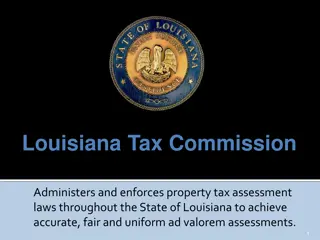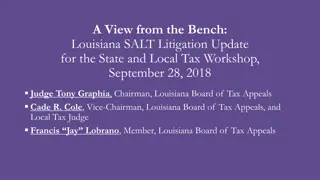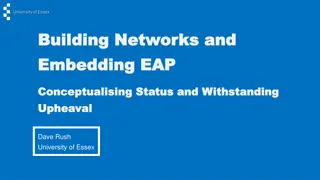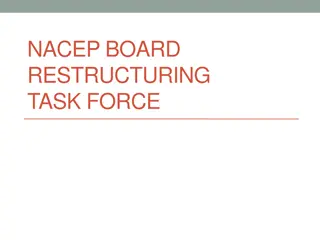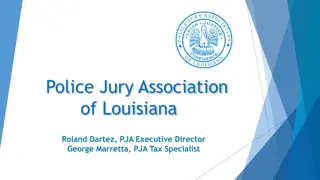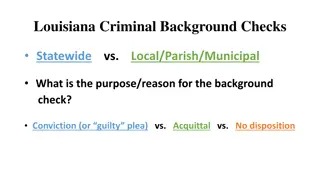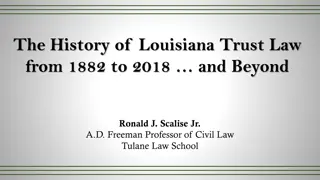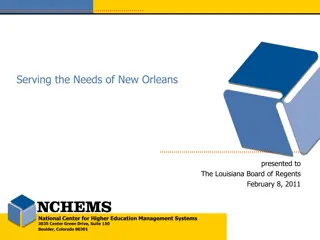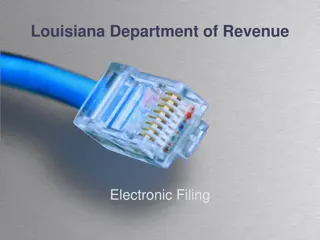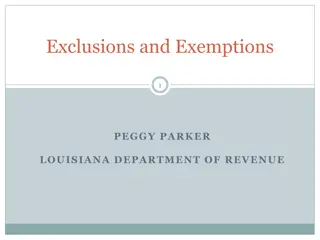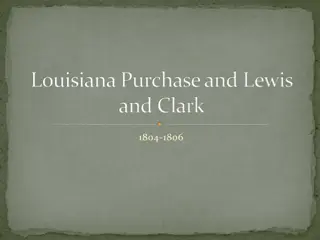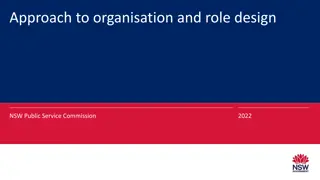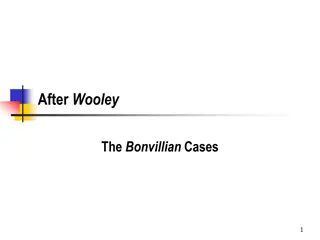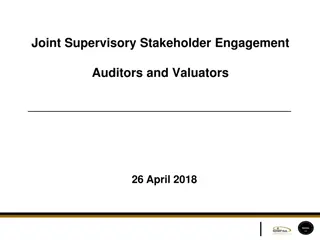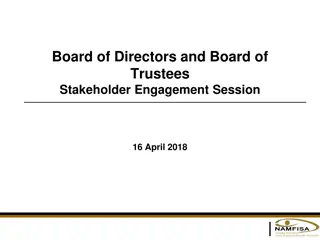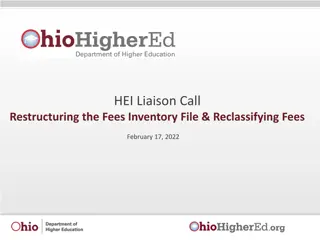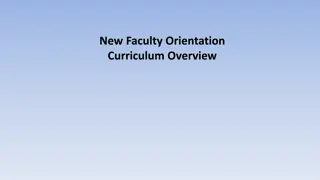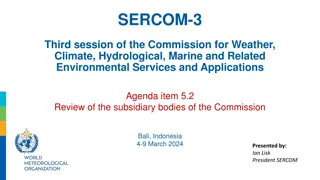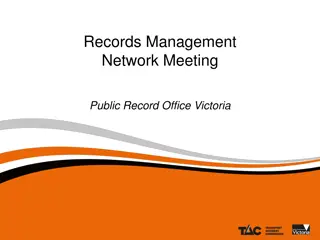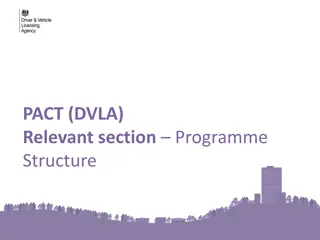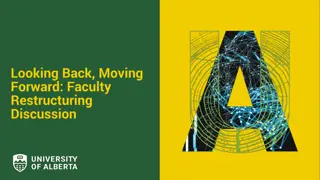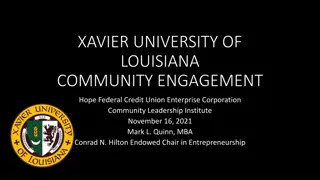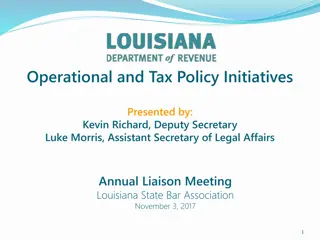Government Restructuring Initiatives in Louisiana
The Task Force on Structural Change and Fiscal Policy in Louisiana was created to address the need for a stable and effective government that meets citizens' needs through quality programs and efficient services. HCR 11 emphasizes structural changes to bring about long-term improvements in state government operations and cost savings. Reorganizing government agencies, as discussed by the Center for American Progress, presents challenges due to stakeholder interests and political capital required. Lessons from past reorganization efforts highlight the importance of clear goals, political readiness, and awareness of internal and external challenges.
Uploaded on Oct 05, 2024 | 0 Views
Download Presentation

Please find below an Image/Link to download the presentation.
The content on the website is provided AS IS for your information and personal use only. It may not be sold, licensed, or shared on other websites without obtaining consent from the author. Download presentation by click this link. If you encounter any issues during the download, it is possible that the publisher has removed the file from their server.
E N D
Presentation Transcript
Louisiana Governmental Reorganization Commission A Presentation to the Task Force on Structural Change and Fiscal Policy
Why was the Task Force created? WHEREAS, the citizens of the State of Louisiana expect and deserve a stable and effective government that meets the needs of citizens through (quality) programs and efficient services; and WHEREAS, setting the state on a path of continued fiscal responsibility requires a thorough review of all areas of state operations and spending; and WHEREAS, government in which (can be reformed) to produce savings or additional revenues for the state; and there are numerous areas within state WHEREAS, the legislature has the authority to make and change the laws of the state and enact policies that will improve the efficiency and government in order to stabilize the budget for future years effectiveness of state
HCR 11 -Not Just About Revenue Therefore Be It Resolved that the Louisiana Legislature does hereby create the Task Force on Structural Changes in Budget and Tax Policy to urge and request the governor to support and implement initiatives for structural change introduced in the upcoming sessions of the legislature to bring about long-term improvements services of state government as well as cost savings through more efficient and effective state operations. to the programs and
Structural Change Center for American Progress Executive Reorganization, June 2011 Reorganizing government agencies is not for the faint of heart. Like reducing the deficit, everyone is in favor of it but its allure fades when presidents confront the winners and losers of change. The iron law of reorganization is that the intensity of a stakeholder s interest is inversely proportional to the size of the stake at risk. No unit of government is so obscure or redundant that an agency head or member of Congress will not (try) to defend it. Structural reorganizations, in which agencies are eliminated organizational chart, are especially difficult. or shifted on an
Six Lessons from the Carter Era Center for American Progress Executive Reorganization, June 2011 Be crystal clear about reorganization s goals. The more concrete and policy-related the better. Don t underestimate the political capital required of the President. He must be prepared to invest his personal time to achieve a success. Be ready for the war within. internally as to outside groups. Agencies care deeply about turf and will fight hard to defend it. Spend as much time selling the plan Be ready for the war on the Hill. Reorganizations can only be enacted by Congress. Resistance is vehement especially among lawmakers for various reasons. Enlist external allies and understand foes. Key players with a stake in the outcome must be identified and brought on board, to preempt opposition Reorganization requires organization. There is more to reorganization than the politics. It requires a skilled team to lead the effort.
Defense Base Closure and Realignment Commission Purpose: Reviews the analysis of the Secretary of Defense as to the timely closure and realignment of US military installations and reports recommendations to the President. Membership: 9 members appointed by the President for term of the Commission. Paid for services as special government employees. Commission Meetings: Meet at the call of the Chairman. Duration of the Commission: April 15, 2006. Agency Support: Federal Agencies provide support as requested. Termination Date: Upon completion of its mission or two years whichever is sooner unless it extended by Congress. Operating Costs: $10 million including travel costs and contract support.
Louisiana Governmental Reorganization Commission
Why a Constitutional Commission? Government Reorganization: Strategies and Tools to Get it Done 2004 by the National Commission On the Public Service Policy makers have many models to study and possibly follow, but experience has shown that new approaches are needed for proponents of reorganization to succeed. Successful reorganization poses even more of a challenge in today s political climate than it has in the past. This is the result of two present-day phenomena. First, our government and the electorate are very evenly divided politically. Second, the existing allocation of national resources is fiercely guarded by the power structure and its constituencies.
Subject Matter Jurisdiction The Commission shall have the responsibility to review and make recommendation as to the modification, elimination or consolidation of all programs, agencies, functions, and services as well as the organizational structure of state government except the Judiciary, the Office of the Governor and the Legislature. The Commission may not consider matters of general civil law or criminal law or matters set out in related codes of civil or criminal procedure. Every recommendation must be considered and voted on by membership of both houses of the Legislature.
Membership Senate Bill 55 followed the Ethics Board Process Seven appointed by Governor. At least one member shall be appointed from each congressional district; 2 each appointed by the House and Senate. In preparing the list of nominees, the nominating committee shall give due consideration to the demographics of the population of the State, including without limitation geography, gender, and race
Membership Term not more than 4 years Commission will expire at end of 4 years and may not be reinstated or extended except by 2/3rdsvote of both houses. Commission may terminate activities at anytime after 2 years by vote of 6 or more members Post term restrictions Members can not be elected to any state or federal political office for 2 years following expiration of term.
Membership Compensation of Commissioners Same as judges on the Court of Appeal The structure, rules of procedure and expenses for operations including staff -- similar to that established for Louisiana Ethics Board. May employ other staff and experts as required Ethics Members are subject to Code of Ethics
Open Meetings Law Exception Commission may conduct review and investigations of governmental operations in a closed meeting. No action may be taken to approve or amend a recommendation except in an open meeting called and scheduled in accordance with the open meetings law. No recommendation may be approved without adequate opportunity for public review and comment.
Recommendations -Prefiling Recommendations may be pre-filed or submitted to Legislature just like any other bill. Revenue measures must originate in the House of Representatives. In a special session the Commission may file recommendations on any item included in the call.
Recommendations Referred to Committee Recommendations are referred to committee by subject matter just like any other legislative instrument. However, committee may not defer but must report the recommendation as drafted to full House. Report is either with amendments or without amendments, however amendments must be approved by a separate vote of the full House or Senate. A Favorable or Unfavorable recommendation of committee is not necessary. The instrument must be placed on the regular/special calendar and scheduled for a final vote. The commission may file duplicate recommendations in House and Senate.
Legislative Sponsor Commission may designate at least one member of each house to handle legislation as author of the measure. If not, Chairman or his designee may present the measure in committee and on floor of House and Senate.
Approvals Recommendations may be rejected or amended by favorable vote of at least 63 members of house and 24 members of senate (no less than 10 days before the end of the regular session.) If not rejected recommendation is submitted to Governor for approval -- or voters (if a constitutional amendment). Approval by Governor -- Recommendation (other than a constitutional amendment) must be approved by the Governor just like any legislative measure no less than 5 days before the end of the regular session otherwise it becomes effective. Constitutional amendments must be considered by voters at next available election date.
Vetoes Regular Session Veto Recommendation considered to be approved and is subject to veto. If Governor vetoes a measure, message must be filed with both houses no later than 2 days prior to last day of session and must be considered by legislature for an override by majority vote of the members of each house prior to adjournment of a regular session. Special Session Veto Recommendations (other amendment) submitted during a special session are also subject to veto. However, no override of veto is possible. not rejected by Legislature is than a constitutional
Comments and Suggestions Reduce the size of the commission Eliminate the super majority vote to reject; reject proposals by a majority vote like any other bill or resolution Instead of requiring the proposals be rejected proposals must be approved by majority vote like any other legislative instrument Require that legislative proposals be filed and discussed in open meeting at least 30 days before placed on Commission agenda for adoption for consideration (Continued)
Comments and Suggestions Define the public review and comment provision Add restriction preventing commission mebers from holding future local elective office Budget of committee subject to normal appropriation process subject to a minimum funding requirement Allow the Legislature to terminate the Commission by 2/3rds majority vote




